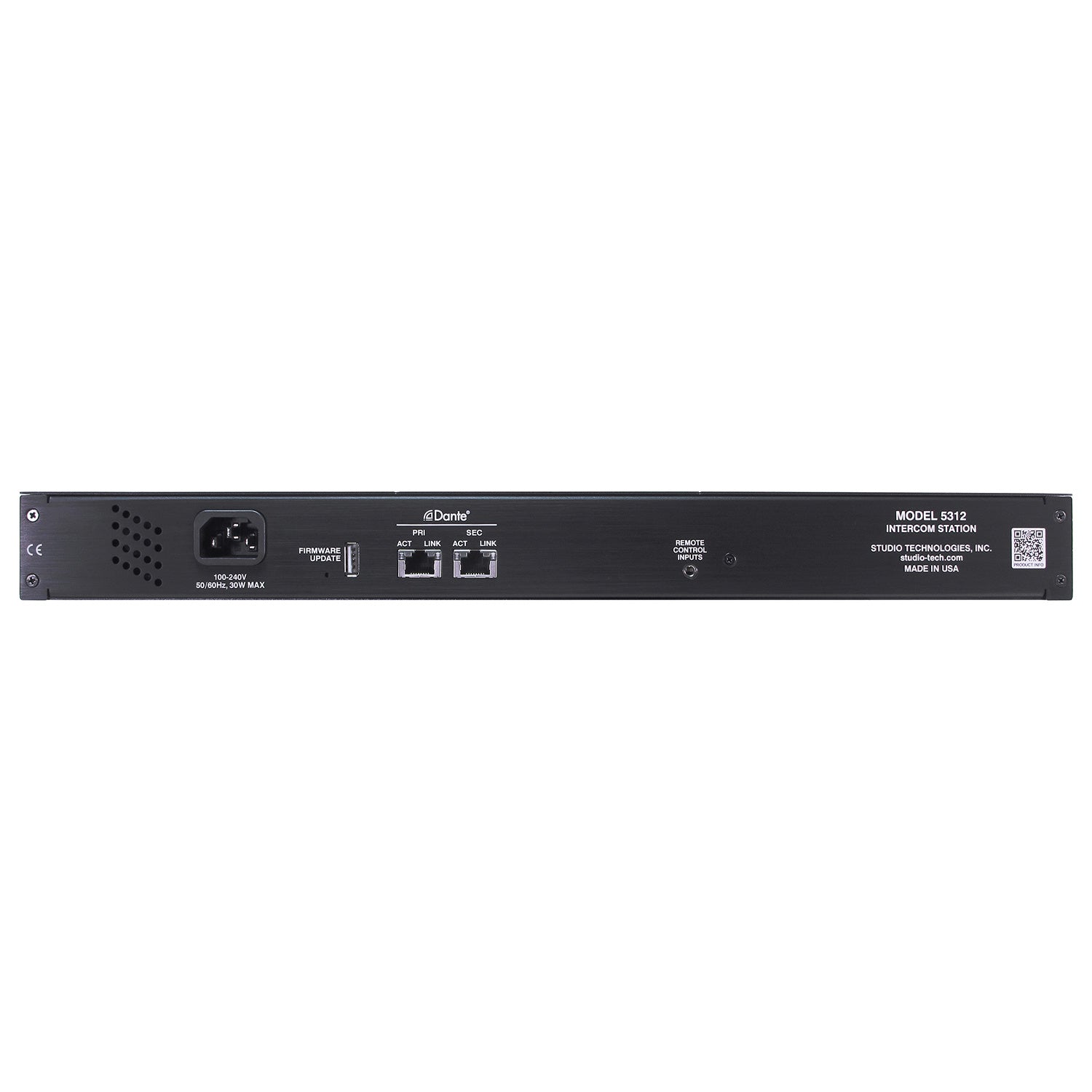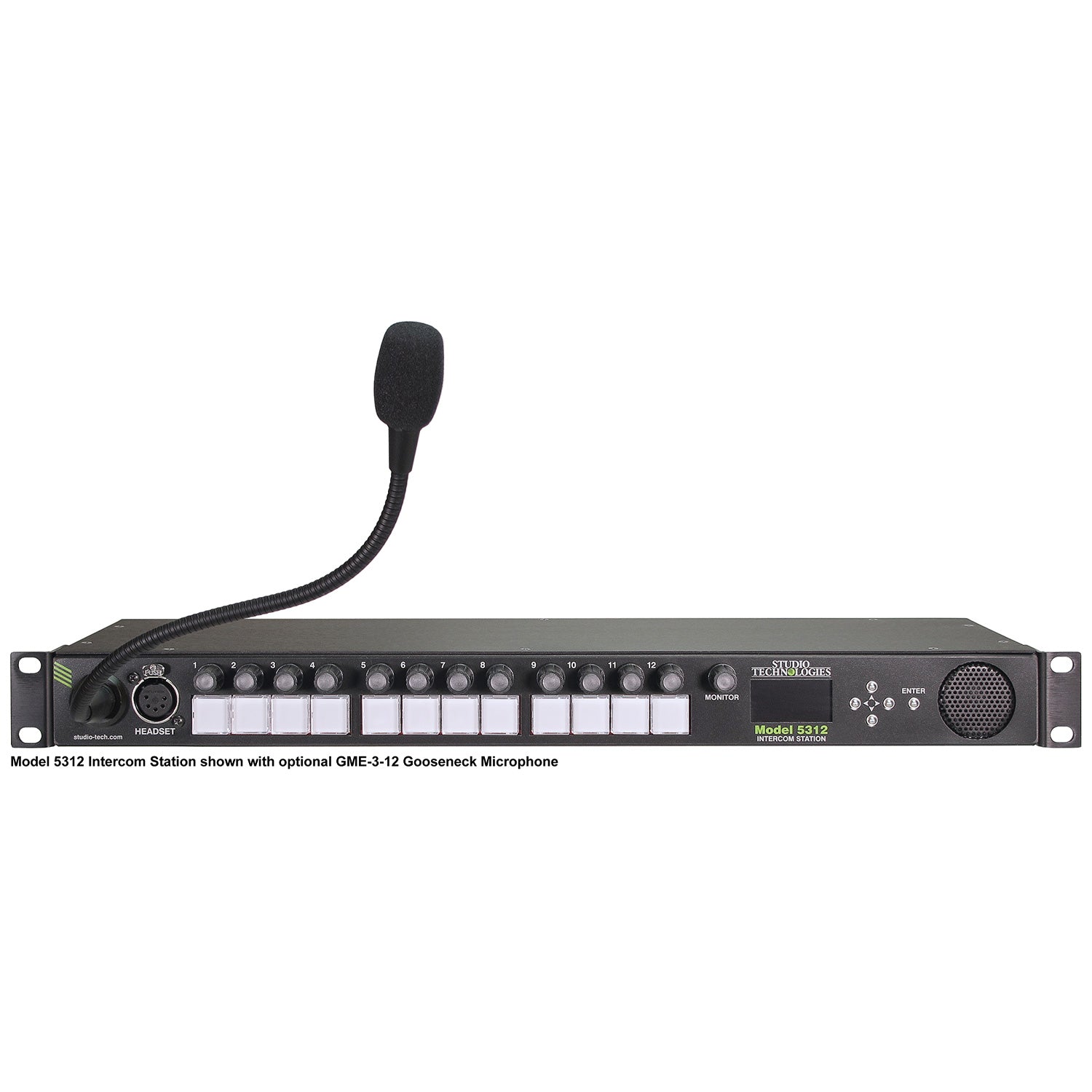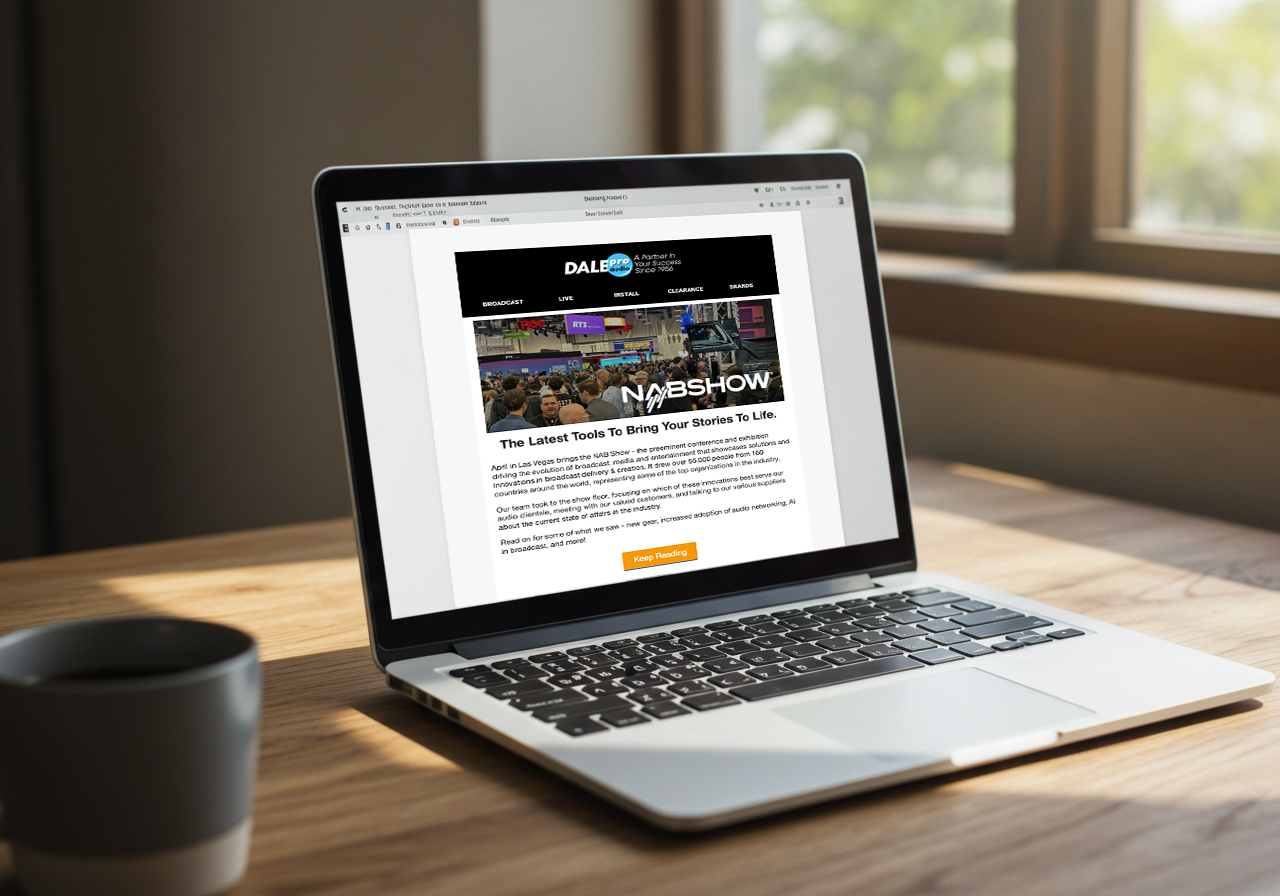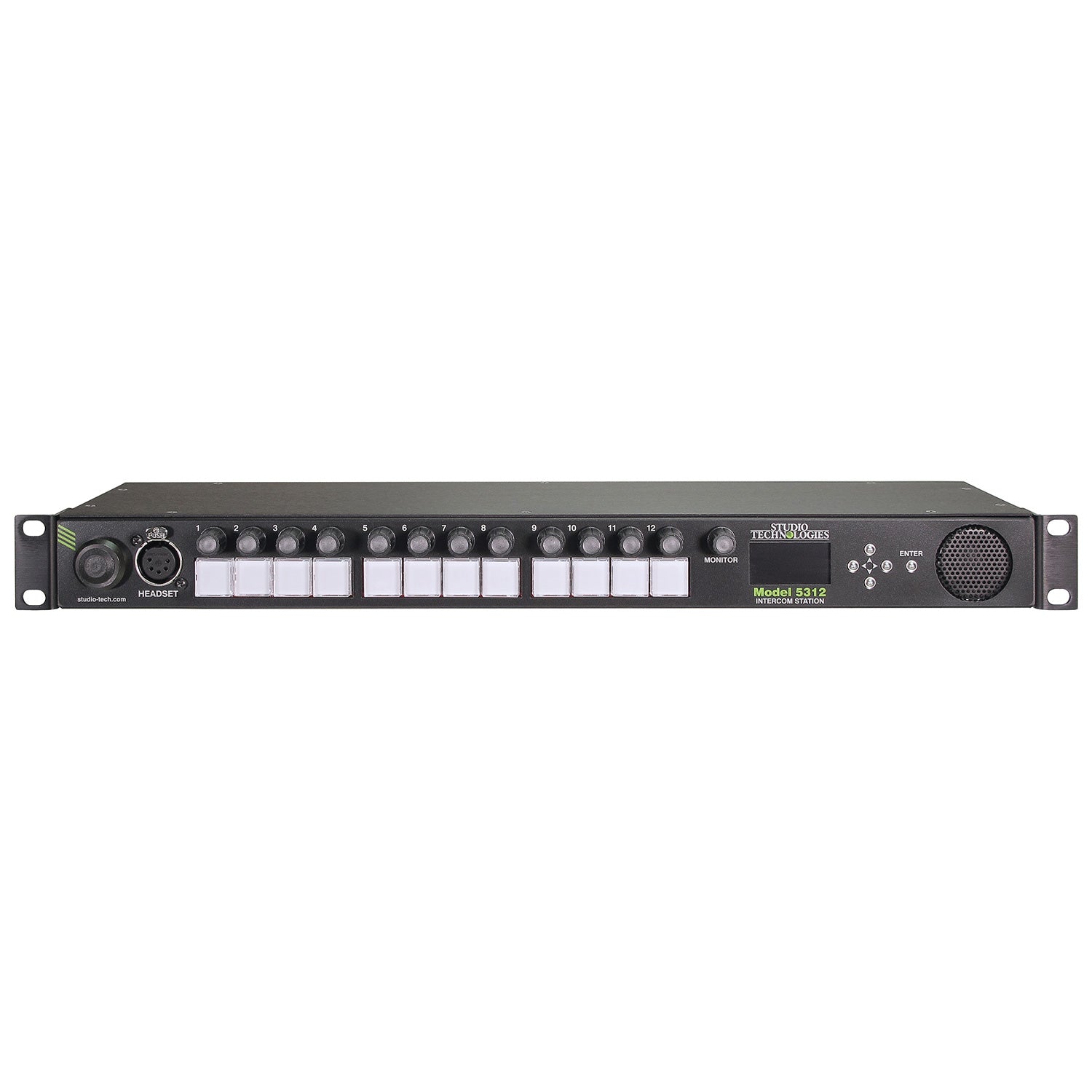
Description
The Model 5312 Intercom Station provides 12 independent talk and listen channels that are compatible with Dante® audio-over-Ethernet networks. The rack-mounted unit is designed to serve as an audio control center for production and support personnel in numerous applications including on-air television sports and news broadcasting, live events, theater, industrial, aerospace, and corporate AV. The Model 5312's channels can be part of virtual "party-lines" created with other compatible devices or be used directly in point-to-point intercom implementations. The range of resources makes it simple to use the Model 5312 locally, or as part of a REMI or "At-Home" geographically diverse implementation. In addition to intercom applications, the unit can create multiple independent IFB (talent cue) channels. Other applications may benefit from a Model 5312 user's ability to easily create monitor mixes from the 12 input audio channels. This makes the unit a viable choice for listen-only scenarios.
Features:
- Dante audio-over-Ethernet technology
- Excellent audio quality
- 12 independent talk and listen channels
- 5-pin female XLR headset connector
- ¼-inch gooseneck microphone connector
- Built-in speaker
- IFB (talent cue) functions
- Call send and receive functions
- Uses STcontroller for configuration
- Redundant Ethernet connections
- Universal AC mains powering
- Lightweight enclosure, single rack-space (1U) mounting
Over a standard Ethernet network, multiple Model 5312 units can be used in party-line (PL) intercom applications with help from external Dante-enabled audio devices such as the Studio Technologies' Model 5421 or Model 5422A Dante Intercom Audio Engines. Model 5312 units can also be used "point-to-point" or interfaced with Dante-compatible matrix intercom systems. The Model 5312 includes two RJ45 jacks which allow interfacing with single or redundant Dante Ethernet networks. The unit features a "universal" mains input, allowing a source of 100-240 volts AC, 50/60 Hz to provide operating power.
The Model 5312 supports connection of a broadcast- or intercom-style headset that incorporates a dynamic or electret (DC powered) microphone. A 5-pin female XLR connector, located on the front panel, allows traditional "pro" headsets to be utilized. In addition, the Studio Technologies' GME-3-12 electret gooseneck microphone can be directly connected using the ¼-inch jack assembly that is also located on the front panel. A low-noise microphone preamplifier and associated voltage-controlled-amplifier (VCA) dynamics controller (compressor) ensures excellent headset and gooseneck microphone audio quality while minimizing the chance of signal overload.
The Model 5312 includes both a "hot mic" Dante transmitter (output) channel and four auxiliary Dante receiver (input) channels, with one of the latter able to be used as the unit's talk audio source. These resources were specifically included to allow two Model 5312 units to "work" together to support more than 12 talk channels. A graphics display and pushbutton switches on the unit's front panel allows users to select the active talk audio source. Choices include the headset mic, the gooseneck mic, and an auxiliary Dante receiver (input) channel.
All Model 5312 operating features are configured using the STcontroller software application. An extensive set of parameters allows the unit's functions to be tailored to meet the needs of many applications. STcontroller is available, free of charge, from the Studio Technologies' website. Versions are available that are compatible with the Windows® and macOS® operating systems. STcontroller is a fast and simple means of reviewing, revising, saving, and loading a unit's operating parameters.
The Model 5312's front panel includes 13 rotary controls (encoders), 12 of which are used to adjust the level of the Dante receiver ( input) signal sources and create a monitor "mix." Using RGB (red-green-blue) LEDs, the knob of each encoder is illuminated and can display if a channel is muted, can indicate if a signal is present on its associated audio input, and can light when an in-band (20 kHz tone) call signal is detected. A graphics display and five pushbutton switches on the Model 5312's front panel allows select operating features to be displayed and configured.
The user can monitor the mix of the Dante receiver (input) channels by means of the headset, a built-in speaker, or two Dante transmitter (output) channels. The 13th rotary encoder, located on the front panel, is used to control the overall audio level and on/off (mute) status of the signals being sent to the headset and speaker outputs.
Extensive configuration choices allow the operation of the 12 pushbutton switches and associated Dante transmitter (output) channels to be optimized to meet the needs of an extensive range of specialized applications. They can be independently configured for talk (intercom), IFB (talent cue), call signal (20 kHz tone), and other related actions. Buttons can also be configured to provide an "all-call" action associated with other buttons that are configured for talk and IFB functions.
As previously mentioned, the Model 5312 includes a hot mic Dante transmitter (output) channel. When enabled, this allows an always-active signal associated with the selected talk (typically microphone) audio source to be utilized by devices such as monitor loudspeakers or matrix intercom systems. A tally tone Dante transmitter (output) channel is also provided. This output provides an 18 kHz sine wave signal whenever one or more of the 12 talk button functions is active. This can be utilized by external systems that require a trigger signal for muting a loudspeaker system or to indicate that a microphone associated with the Model 5312 is active.
For performance confirmation the unit provides an integrated sidetone function, allowing audio coming from the active talk audio source to be routed to the headset output. An audible alert, using the internal speaker, can be generated in response to a high-frequency call signal. The Model 5312 includes two remote control inputs, accessible by way of a 3-conductor 3.5 mm jack, which can be configured to mimic the action of two of the talk pushbutton switches.
The Model 5312 is intended for rack (1U) mounting and has overall dimensions of 19.0 inches wide (16.5 cm), 1.72 inches high (4.4 cm), and 5.3 inches deep (13.5 cm). The enclosure is made of aluminum and weighs just 2.4 pounds (1.1 kg). The unit's firmware (embedded software) can be updated using the USB port on the back of the unit; the Dante firmware can be updated via an Ethernet connection.
Ethernet Data
The Model 5312 connects to one or two local area networks (LANs) by way of twisted-pair Ethernet interfaces. The unit's 1000BASE-T Gigabit Ethernet (GigE) interconnections are made by way of two RJ45 jacks. The Ethernet interfaces can be configured, using the Dante Controller software applications, to serve in switched or redundant modes.
Dante Audio-over-Ethernet
Audio data is sent to and received from the Model 5312 using the Dante audio-over-Ethernet media networking technology. As a Dante-compliant device, the Model 5312's 16 Dante transmitter (output) audio channels and 16 Dante receiver (input) audio channels can be assigned (routed or "subscribed") using the Dante Controller software application. The Dante transmitter and receiver channels support 32 Dante flows in each direction. The digital audio's bit depth is up to 32 with a sample rate of 48 kHz. The Model 5312 is compliant with the AES67 interoperability standard. In addition, it's compatible with the Dante Domain Manager™ (DDM) software application from Audinate®. Bi-color LEDs, located on the unit's back panel, provide status indications of Ethernet network performance.
Audio Quality
The Model 5312's audio performance is completely "pro." A low-noise, wide dynamic-range microphone preamplifier and associated voltage-controlled-amplifier (VCA) dynamics controller (compressor) ensure that headset and gooseneck microphone audio quality is preserved and minimizes the chance of signal overload. The output of the microphone preamp and compressor is routed to an analog-to-digital conversion (ADC) section that supports a sampling rate of 48 kHz. The now-digital talk audio signal routes through a 32-bit microcontroller integrated circuit and on to the Dante interface section where it is packetized and prepared for transport over Ethernet. A total of 16 Dante transmitter (output) channels are provided: one associated with each of the unit's 12 talk channels, two monitor output channels, one hot mic output channel, and one tally tone channel.
Audio input signals arrive via 16 Dante receiver (input) channels and pass into the Model 5312's 32-bit microcontroller. Twelve input channels are associated with the monitor section while the other four serve as auxiliary channels. One or more of these latter channels can be used as program sources for the IFB (talent cue) functions or as a talk audio source. All channel routing, headphone, speaker, and monitor level control, IFB creation, and sidetone functionality are performed within the digital domain. This provides flexibility, allows precise level control, and eliminates the need for analog audio signals from having to pass through electromechanical level controls. The audio signals destined for the headphone and speaker outputs are sent to high-performance digital-to-analog (DAC) converter circuitry and then on to robust driver circuitry.
Future Capabilities and Firmware Updating
The Model 5312 was designed so that its capabilities and performance can be easily enhanced in the future. A USB receptacle, located on the unit's back panel, allows the application firmware (embedded software) files to be updated using a USB flash drive. The Model 5312 uses the Brooklyn module from Audinate to implement its Dante interface. The firmware in this module can be updated via an Ethernet connection, helping to ensure that its capabilities remain up to date.
| Applications | Dante-based broadcast, theater, industrial, and aerospace intercom; broadcast IFB (talent cue) master station; audio monitor mixer |
| Network Audio Technology | Type: Dante audio-over-Ethernet AES67-2018 Support: yes, selectable on/off Dante Domain Manager (DDM) Support: yes Ethernet Interface Configuration: Switched or Redundant Bit Depth: 16, 24, or 32 Sample Rate: 48 kHz Number of Dante Receiver (Input) Channels: 16 Number of Dante Transmitter (Output) Channels: 16 Number of Dante Flows: 32 transmitter, 32 receiver Internal Digital Audio Processing: 32-bit, fixed Input-to-Output Audio Processing Latency: <200 uSec Nominal Input and Output Level: Ð20 dBFS |
| Network Interfaces | 2, primary (PRI) and secondary (SEC) Type: 1000BASE-T Gigabit Ethernet (GigE) per IEEE 802.3ab (10 and 100 Mb/s not supported) |
| Microphone Input Ð Headset | Compatibility: single- or dual-ear broadcast-style with dynamic or electret (low-voltage DC-powered) microphone: pin 1 mic common; pin 2 mic; pin 3 phones common; pin 4 phones left; pin 5 phones right Type: unbalanced Impedance: 1 k ohms, nominal, microphone power off; 690 ohms, nominal, microphone power on Gain: 26, 32, 38, 44, 50 dB, selectable Frequency Response: Ð4 dB at 30 Hz, Ð2.6 dB at 40 Hz, Ð1.8 dB at 50 Hz, Ð2.4 dB at 10 kHz, Ð3.8 dB at 20 kHz Distortion (THD+N): <0.09%, measured at Ð20 dBFS, 22 Hz to 22 kHz bandwidth, 38 dB of gain Dynamic Range:>93 dB, A-weighted, 26 dB gain |
| Microphone Input Ð Gooseneck | Compatibility: Studio Technologies' GME-3-12 Microphone Power: 3.3 volts DC via 2.49 k resistor Impedance: 2.0 k ohms, nominal Gain: 12, 18, 24, 30, 36, 42 dB, selectable Frequency Response: Ð3.0 dB at 40 Hz, Ð2.0 dB at 50 Hz, Ð2.0 dB at 16 kHz, Ð3.0 dB at 20 kHz Distortion (THD+N): <0.04%, measured at Ð20 dBFS, 22 Hz to 22 kHz bandwidth, 36 dB of gain Dynamic Range:>97 dB, A-weighted, 12 dB gain |
| Compressor | Application: applies to headset and gooseneck microphone audio Threshold: 1 dB above nominal Dante transmitter (output) level (Ð19 dBFS) (Ð13 dBFS when gooseneck mic gain selected for 42 dB) Slope: 2:1 |
| Dante Receivers (Inputs) Ð Monitor 1-12 | Frequency Response: not applicable, sources are Dante receivers (inputs) which pass data through to Dante transmitters (outputs) |
| Dante Receivers (Inputs) Ð Auxiliary 1-4 | Applications: configurable as IFB program audio sources and auxiliary talk input Frequency Response (Call Detect Disabled): not applicable, sources are Dante receivers (inputs) which pass data through to Dante transmitters (outputs) Frequency Response (Call Detect Enabled): 20 Hz to 12 kHz, +0/Ð3 dB, nominal Level Trim: Ð12, Ð6, 0, 6, and 12 dB, adjustable |
| Dante Transmitters (Outputs) Ð Monitor Outputs 1-2 | Dim (Attenuation): 0, 6, 12, 18 dB, configurable |
| Dante Transmitter (Output) Ð Tally Tone | Frequency: 18 kHz sine wave Level: Ð20 dBFS |
| Headset Headphone Output | Type: 2-channel (stereo) Compatibility: intended for connection to stereo (dual-channel) or monaural (single-channel) headsets with a nominal impedance of 50 ohms or greater Maximum Output Voltage: 3.0 Vrms, 1 kHz, 150 ohms load Frequency Response: 20 Hz to 20 kHz, +0/Ð1 dB Distortion (THD+N): <0.02% Dynamic Range:>93 dB Dim (Attenuation): 0, 6, 12, 18 dB, configurable |
| Speaker Monitor Output | Type: single-channel (monaural) Speaker: 1.5-inch (37 mm) diameter Maximum Power: 5 watts RMS, nominal Frequency Response: 150 Hz to 20 kHz, ±3 dB Dim (Attenuation): 0, 6, 12, 18 dB, configurable |
| 18 kHz and 20 kHz Tone Outputs | Type: sine wave Level: Ð20 dBFS Frequency Accuracy: <10 ppm Distortion: <0.0001% |
| Call Function | Receive Frequency: 20 kHz, ±800 Hz, within audio channel Receive Level: Ð27 dBFS minimum Send Frequency: 20 kHz Send Level: Ð20 dBFS Audible Alert: 3-burst sequence, 524 Hz, sine wave, selectable level range |
| Remote Control Inputs | Amount: 2 Function: configurable, can mimic the action of two talk buttons Type: active low, 1 mA maximum, input pulled up to 3.3 volts DC via 3.4 k ohm resistors |
| Power Source | 100 to 240 V, 50/60 Hz; 30 W maximum |
| Connectors | Headset: 5-pin female XLR Gooseneck Microphone: 3-conductor _-inch with 7/16-20 UNF threaded bushing; 4-40 UNC hex head socket set screw allows microphone to be secured into bushing Ethernet: 2, RJ45 jacks Remote Control Inputs: 3-conductor (TRS) 3.5 mm jack USB: type A receptacle (used only for updating firmware) AC Mains Input: 3-blade, IEC 320 C14-compatible (mates with IEC 320 C13) |
| Configuration | requires Studio Technologies' STcontroller software application |
| Software Updating | USB flash drive supports updating of Main MCU, Secondary MCU, and Main FPGA firmware (embedded software); Dante interface updated via Ethernet interface |
| Environmental | Operating Temperature: 0 to 50 degrees C (32 to 122 degrees F) Storage Temperature: Ð40 to 70 degrees C (Ð40 to 158 degrees F) Humidity: 0 to 95%, non-condensing Altitude: not characterized |
| Dimensions (Overall) | 19.0 inches wide (48.3 cm) 1.72 inches high (4.4 cm) 5.3 inches deep (13.5 cm) |
| Mounting | one space (1U) in a standard 19-inch rack |
| Weight | 2.4 pounds (1.1 kg) |
The Model 5312 Intercom Station provides 12 independent talk and listen channels that are compatible with Dante® audio-over-Ethernet networks. The rack-mounted unit is designed to serve as an audio control center for production and support personnel in numerous applications including on-air television sports and news broadcasting, live events, theater, industrial, aerospace, and corporate AV. The Model 5312's channels can be part of virtual "party-lines" created with other compatible devices or be used directly in point-to-point intercom implementations. The range of resources makes it simple to use the Model 5312 locally, or as part of a REMI or "At-Home" geographically diverse implementation. In addition to intercom applications, the unit can create multiple independent IFB (talent cue) channels. Other applications may benefit from a Model 5312 user's ability to easily create monitor mixes from the 12 input audio channels. This makes the unit a viable choice for listen-only scenarios.
Features:
- Dante audio-over-Ethernet technology
- Excellent audio quality
- 12 independent talk and listen channels
- 5-pin female XLR headset connector
- ¼-inch gooseneck microphone connector
- Built-in speaker
- IFB (talent cue) functions
- Call send and receive functions
- Uses STcontroller for configuration
- Redundant Ethernet connections
- Universal AC mains powering
- Lightweight enclosure, single rack-space (1U) mounting
Over a standard Ethernet network, multiple Model 5312 units can be used in party-line (PL) intercom applications with help from external Dante-enabled audio devices such as the Studio Technologies' Model 5421 or Model 5422A Dante Intercom Audio Engines. Model 5312 units can also be used "point-to-point" or interfaced with Dante-compatible matrix intercom systems. The Model 5312 includes two RJ45 jacks which allow interfacing with single or redundant Dante Ethernet networks. The unit features a "universal" mains input, allowing a source of 100-240 volts AC, 50/60 Hz to provide operating power.
The Model 5312 supports connection of a broadcast- or intercom-style headset that incorporates a dynamic or electret (DC powered) microphone. A 5-pin female XLR connector, located on the front panel, allows traditional "pro" headsets to be utilized. In addition, the Studio Technologies' GME-3-12 electret gooseneck microphone can be directly connected using the ¼-inch jack assembly that is also located on the front panel. A low-noise microphone preamplifier and associated voltage-controlled-amplifier (VCA) dynamics controller (compressor) ensures excellent headset and gooseneck microphone audio quality while minimizing the chance of signal overload.
The Model 5312 includes both a "hot mic" Dante transmitter (output) channel and four auxiliary Dante receiver (input) channels, with one of the latter able to be used as the unit's talk audio source. These resources were specifically included to allow two Model 5312 units to "work" together to support more than 12 talk channels. A graphics display and pushbutton switches on the unit's front panel allows users to select the active talk audio source. Choices include the headset mic, the gooseneck mic, and an auxiliary Dante receiver (input) channel.
All Model 5312 operating features are configured using the STcontroller software application. An extensive set of parameters allows the unit's functions to be tailored to meet the needs of many applications. STcontroller is available, free of charge, from the Studio Technologies' website. Versions are available that are compatible with the Windows® and macOS® operating systems. STcontroller is a fast and simple means of reviewing, revising, saving, and loading a unit's operating parameters.
The Model 5312's front panel includes 13 rotary controls (encoders), 12 of which are used to adjust the level of the Dante receiver ( input) signal sources and create a monitor "mix." Using RGB (red-green-blue) LEDs, the knob of each encoder is illuminated and can display if a channel is muted, can indicate if a signal is present on its associated audio input, and can light when an in-band (20 kHz tone) call signal is detected. A graphics display and five pushbutton switches on the Model 5312's front panel allows select operating features to be displayed and configured.
The user can monitor the mix of the Dante receiver (input) channels by means of the headset, a built-in speaker, or two Dante transmitter (output) channels. The 13th rotary encoder, located on the front panel, is used to control the overall audio level and on/off (mute) status of the signals being sent to the headset and speaker outputs.
Extensive configuration choices allow the operation of the 12 pushbutton switches and associated Dante transmitter (output) channels to be optimized to meet the needs of an extensive range of specialized applications. They can be independently configured for talk (intercom), IFB (talent cue), call signal (20 kHz tone), and other related actions. Buttons can also be configured to provide an "all-call" action associated with other buttons that are configured for talk and IFB functions.
As previously mentioned, the Model 5312 includes a hot mic Dante transmitter (output) channel. When enabled, this allows an always-active signal associated with the selected talk (typically microphone) audio source to be utilized by devices such as monitor loudspeakers or matrix intercom systems. A tally tone Dante transmitter (output) channel is also provided. This output provides an 18 kHz sine wave signal whenever one or more of the 12 talk button functions is active. This can be utilized by external systems that require a trigger signal for muting a loudspeaker system or to indicate that a microphone associated with the Model 5312 is active.
For performance confirmation the unit provides an integrated sidetone function, allowing audio coming from the active talk audio source to be routed to the headset output. An audible alert, using the internal speaker, can be generated in response to a high-frequency call signal. The Model 5312 includes two remote control inputs, accessible by way of a 3-conductor 3.5 mm jack, which can be configured to mimic the action of two of the talk pushbutton switches.
The Model 5312 is intended for rack (1U) mounting and has overall dimensions of 19.0 inches wide (16.5 cm), 1.72 inches high (4.4 cm), and 5.3 inches deep (13.5 cm). The enclosure is made of aluminum and weighs just 2.4 pounds (1.1 kg). The unit's firmware (embedded software) can be updated using the USB port on the back of the unit; the Dante firmware can be updated via an Ethernet connection.
Ethernet Data
The Model 5312 connects to one or two local area networks (LANs) by way of twisted-pair Ethernet interfaces. The unit's 1000BASE-T Gigabit Ethernet (GigE) interconnections are made by way of two RJ45 jacks. The Ethernet interfaces can be configured, using the Dante Controller software applications, to serve in switched or redundant modes.
Dante Audio-over-Ethernet
Audio data is sent to and received from the Model 5312 using the Dante audio-over-Ethernet media networking technology. As a Dante-compliant device, the Model 5312's 16 Dante transmitter (output) audio channels and 16 Dante receiver (input) audio channels can be assigned (routed or "subscribed") using the Dante Controller software application. The Dante transmitter and receiver channels support 32 Dante flows in each direction. The digital audio's bit depth is up to 32 with a sample rate of 48 kHz. The Model 5312 is compliant with the AES67 interoperability standard. In addition, it's compatible with the Dante Domain Manager™ (DDM) software application from Audinate®. Bi-color LEDs, located on the unit's back panel, provide status indications of Ethernet network performance.
Audio Quality
The Model 5312's audio performance is completely "pro." A low-noise, wide dynamic-range microphone preamplifier and associated voltage-controlled-amplifier (VCA) dynamics controller (compressor) ensure that headset and gooseneck microphone audio quality is preserved and minimizes the chance of signal overload. The output of the microphone preamp and compressor is routed to an analog-to-digital conversion (ADC) section that supports a sampling rate of 48 kHz. The now-digital talk audio signal routes through a 32-bit microcontroller integrated circuit and on to the Dante interface section where it is packetized and prepared for transport over Ethernet. A total of 16 Dante transmitter (output) channels are provided: one associated with each of the unit's 12 talk channels, two monitor output channels, one hot mic output channel, and one tally tone channel.
Audio input signals arrive via 16 Dante receiver (input) channels and pass into the Model 5312's 32-bit microcontroller. Twelve input channels are associated with the monitor section while the other four serve as auxiliary channels. One or more of these latter channels can be used as program sources for the IFB (talent cue) functions or as a talk audio source. All channel routing, headphone, speaker, and monitor level control, IFB creation, and sidetone functionality are performed within the digital domain. This provides flexibility, allows precise level control, and eliminates the need for analog audio signals from having to pass through electromechanical level controls. The audio signals destined for the headphone and speaker outputs are sent to high-performance digital-to-analog (DAC) converter circuitry and then on to robust driver circuitry.
Future Capabilities and Firmware Updating
The Model 5312 was designed so that its capabilities and performance can be easily enhanced in the future. A USB receptacle, located on the unit's back panel, allows the application firmware (embedded software) files to be updated using a USB flash drive. The Model 5312 uses the Brooklyn module from Audinate to implement its Dante interface. The firmware in this module can be updated via an Ethernet connection, helping to ensure that its capabilities remain up to date.
| Applications | Dante-based broadcast, theater, industrial, and aerospace intercom; broadcast IFB (talent cue) master station; audio monitor mixer |
| Network Audio Technology | Type: Dante audio-over-Ethernet AES67-2018 Support: yes, selectable on/off Dante Domain Manager (DDM) Support: yes Ethernet Interface Configuration: Switched or Redundant Bit Depth: 16, 24, or 32 Sample Rate: 48 kHz Number of Dante Receiver (Input) Channels: 16 Number of Dante Transmitter (Output) Channels: 16 Number of Dante Flows: 32 transmitter, 32 receiver Internal Digital Audio Processing: 32-bit, fixed Input-to-Output Audio Processing Latency: <200 uSec Nominal Input and Output Level: Ð20 dBFS |
| Network Interfaces | 2, primary (PRI) and secondary (SEC) Type: 1000BASE-T Gigabit Ethernet (GigE) per IEEE 802.3ab (10 and 100 Mb/s not supported) |
| Microphone Input Ð Headset | Compatibility: single- or dual-ear broadcast-style with dynamic or electret (low-voltage DC-powered) microphone: pin 1 mic common; pin 2 mic; pin 3 phones common; pin 4 phones left; pin 5 phones right Type: unbalanced Impedance: 1 k ohms, nominal, microphone power off; 690 ohms, nominal, microphone power on Gain: 26, 32, 38, 44, 50 dB, selectable Frequency Response: Ð4 dB at 30 Hz, Ð2.6 dB at 40 Hz, Ð1.8 dB at 50 Hz, Ð2.4 dB at 10 kHz, Ð3.8 dB at 20 kHz Distortion (THD+N): <0.09%, measured at Ð20 dBFS, 22 Hz to 22 kHz bandwidth, 38 dB of gain Dynamic Range:>93 dB, A-weighted, 26 dB gain |
| Microphone Input Ð Gooseneck | Compatibility: Studio Technologies' GME-3-12 Microphone Power: 3.3 volts DC via 2.49 k resistor Impedance: 2.0 k ohms, nominal Gain: 12, 18, 24, 30, 36, 42 dB, selectable Frequency Response: Ð3.0 dB at 40 Hz, Ð2.0 dB at 50 Hz, Ð2.0 dB at 16 kHz, Ð3.0 dB at 20 kHz Distortion (THD+N): <0.04%, measured at Ð20 dBFS, 22 Hz to 22 kHz bandwidth, 36 dB of gain Dynamic Range:>97 dB, A-weighted, 12 dB gain |
| Compressor | Application: applies to headset and gooseneck microphone audio Threshold: 1 dB above nominal Dante transmitter (output) level (Ð19 dBFS) (Ð13 dBFS when gooseneck mic gain selected for 42 dB) Slope: 2:1 |
| Dante Receivers (Inputs) Ð Monitor 1-12 | Frequency Response: not applicable, sources are Dante receivers (inputs) which pass data through to Dante transmitters (outputs) |
| Dante Receivers (Inputs) Ð Auxiliary 1-4 | Applications: configurable as IFB program audio sources and auxiliary talk input Frequency Response (Call Detect Disabled): not applicable, sources are Dante receivers (inputs) which pass data through to Dante transmitters (outputs) Frequency Response (Call Detect Enabled): 20 Hz to 12 kHz, +0/Ð3 dB, nominal Level Trim: Ð12, Ð6, 0, 6, and 12 dB, adjustable |
| Dante Transmitters (Outputs) Ð Monitor Outputs 1-2 | Dim (Attenuation): 0, 6, 12, 18 dB, configurable |
| Dante Transmitter (Output) Ð Tally Tone | Frequency: 18 kHz sine wave Level: Ð20 dBFS |
| Headset Headphone Output | Type: 2-channel (stereo) Compatibility: intended for connection to stereo (dual-channel) or monaural (single-channel) headsets with a nominal impedance of 50 ohms or greater Maximum Output Voltage: 3.0 Vrms, 1 kHz, 150 ohms load Frequency Response: 20 Hz to 20 kHz, +0/Ð1 dB Distortion (THD+N): <0.02% Dynamic Range:>93 dB Dim (Attenuation): 0, 6, 12, 18 dB, configurable |
| Speaker Monitor Output | Type: single-channel (monaural) Speaker: 1.5-inch (37 mm) diameter Maximum Power: 5 watts RMS, nominal Frequency Response: 150 Hz to 20 kHz, ±3 dB Dim (Attenuation): 0, 6, 12, 18 dB, configurable |
| 18 kHz and 20 kHz Tone Outputs | Type: sine wave Level: Ð20 dBFS Frequency Accuracy: <10 ppm Distortion: <0.0001% |
| Call Function | Receive Frequency: 20 kHz, ±800 Hz, within audio channel Receive Level: Ð27 dBFS minimum Send Frequency: 20 kHz Send Level: Ð20 dBFS Audible Alert: 3-burst sequence, 524 Hz, sine wave, selectable level range |
| Remote Control Inputs | Amount: 2 Function: configurable, can mimic the action of two talk buttons Type: active low, 1 mA maximum, input pulled up to 3.3 volts DC via 3.4 k ohm resistors |
| Power Source | 100 to 240 V, 50/60 Hz; 30 W maximum |
| Connectors | Headset: 5-pin female XLR Gooseneck Microphone: 3-conductor _-inch with 7/16-20 UNF threaded bushing; 4-40 UNC hex head socket set screw allows microphone to be secured into bushing Ethernet: 2, RJ45 jacks Remote Control Inputs: 3-conductor (TRS) 3.5 mm jack USB: type A receptacle (used only for updating firmware) AC Mains Input: 3-blade, IEC 320 C14-compatible (mates with IEC 320 C13) |
| Configuration | requires Studio Technologies' STcontroller software application |
| Software Updating | USB flash drive supports updating of Main MCU, Secondary MCU, and Main FPGA firmware (embedded software); Dante interface updated via Ethernet interface |
| Environmental | Operating Temperature: 0 to 50 degrees C (32 to 122 degrees F) Storage Temperature: Ð40 to 70 degrees C (Ð40 to 158 degrees F) Humidity: 0 to 95%, non-condensing Altitude: not characterized |
| Dimensions (Overall) | 19.0 inches wide (48.3 cm) 1.72 inches high (4.4 cm) 5.3 inches deep (13.5 cm) |
| Mounting | one space (1U) in a standard 19-inch rack |
| Weight | 2.4 pounds (1.1 kg) |
Your home for all things pro audio—backed by expertise and experience. Connect with us today.
Your home for all things pro audio—backed by expertise and experience. Connect with us today.
